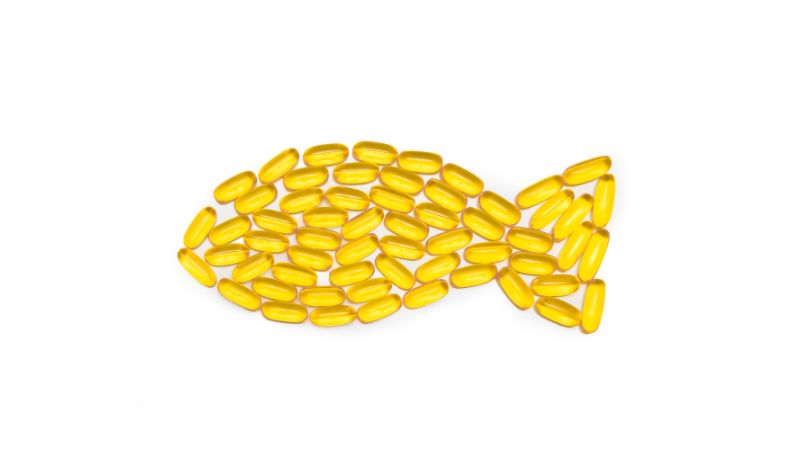
Yes. The omega-3 fatty acids in fish oil (mainly EPA and DHA) are anti-inflammatory. (A reduced level of inflammation allows the body’s defences to perform faster and more effectively.) Fish oil can also boost immunity in dogs’ body systems: including the circulatory system, the nervous system, the joints, the eyes, and hair.
In many processed dog foods, omega-3 essential fatty acids are not present, which is why fish oil looks like a great supplement.
However, one thing may be too good! Anti-inflammatory responses in the body are essential for healing, so you don’t want to suppress them too much. Additionally, too much fish oil can interfere with other vital blood functions.
What is fish oil?
Several types of fish oil include salmon, anchovies, sardines, mackerel, and tuna.
These fish oils are used in the production of fish for humans and dogs due to their beneficial ingredients, called omega-3 fatty acids.
The advantages of fish oil for dogs
It’s great for dog hair.
A dog’s coat becomes brighter and healthier as a result of the EPA in fish oil. In addition to controlling hydration and oil production, it also prevents the thickening of the hair follicle.
Dogs fed omega-3 had improved skin and coat, particularly those suffering from atopic dermatitis and other skin-related diseases.
Regular fish oil supplementation combined with regular brushing (depending on breed) will improve your dog’s coat more than ever.
Anti-inflammatory properties
Omega-3 fats, specifically eicosapentaenoic acid (EPA), are known to act as potent anti-inflammatory agents. The intake of this component in food decreases pro-inflammatory substances.
Thus, fish oil capsules can benefit canines suffering from immune-mediated conditions, osteoarthritis, arthrogryposis, and muscular pain and strain injury.
This factor also pertains to post-surgical recovery, and fish oil can facilitate the dog’s recovery after surgical procedures.
Enhances brain health and function
Omega-3 fats such as DHA and EPA are crucial for cognitive performance.
Fish oil can help dogs with depression, anxiety, and cognitive dysfunction. Memory, learning, and behaviour have also been shown to be improved by fish oil.
Like infants and babies, pups may reap advantages from fish oil, which supports optimal brain growth, mainly when provided to pregnant females.
Relieving anxiety
Fish oil for dogs has many benefits, not just physical. Omega-3 in fish oil can decrease anxiety and improve anxiety symptoms.
The reason for this is that omega-3 promotes healthy brain activity. Research confirms that anxious individuals have lower omega-3 levels than those without fear.
Slows the growth of cancer
A high omega-6 content in dog food can stimulate certain types of canine cancers, whereas a high omega-3 content lowers the risks.
Overconsumption of too much EPA can be reduced by replacing it with EPA, which can be obtained in fish oil.
Because omega-3s reduce the adverse effects of omega-6, they are less likely to trigger cancer development in dogs.
It is crucial to enhance your canine’s nutrition with high-quality EPA and DHA nutrients to prevent cancer.
You can take fish oil capsules or consume meals rich in fatty acids such as krill oil, tuna, sardines, salmon, and catfish.
It helps a dog’s vision.
DHA benefits the brain as well as the eyes.
DHA contributes to optimal vision and growth in canines. The fatty acid can reduce, avoid, or postpone hypertension, ocular dryness, and vision loss.
Skin care remedies
Itchy skin, allergies, dry skin, and dandruff can all be treated with fish oil.
There are a couple of explanations for this. Firstly, fish oil hydrates, so dehydrated skin gains the hydration boost required to repair and rebuild. In addition, EPA and DHA fatty substances in fish oil are antioxidants.
It can be painful for canines to have skin conditions that result in swelling, redness, and scratches.
Inflammation disrupts the cycle of scratching and damaging the skin. Fish oil reduces the symptoms of many skin diseases, including psoriasis.
This will strengthen a dog’s immune system.
A current investigation has revealed that fish oil provides omega-3 fatty acids, which boosts B cell function. An animal’s B cells perform an important role in the inflammatory process of its body.
A B cell is a type of immune cell that produces antibodies. Antibodies bind to germ antigens. It prevents germs and identifies them as invaders that need to be destroyed.
Benefits the health of a dog’s heart
It is widely accepted that fish oil can reduce hypertension and cholesterol levels.
Blood lipids are generally not a problem for canines, but BP can be. A decrease in hypertension can make it simpler for the coronary arteries to circulate blood in some pets with cardiovascular disease.
Fish oil supplements can also reduce the dog’s blood pressure, although prescription medications are most often used.
Fish oil supplementation can help reduce the need for medications that may come with several side effects.
You can utilize it as a food bowler hat.
Fish oil advantages for puppies can also be helpful. Fish oil is lovely to some dogs due to its strong smell and fishy taste.
Adding this smelly, tasty treat to your dog’s diet can motivate them to eat when they are picky.
You can also feed your dog fish oil if it is sick or anorexic due to medication side effects. It is widespread in chronic diseases.
Provides benefits to dogs with canine cognitive dysfunction
Chronic cognitive dysfunction is a normal part of deterioration in the canine mind. Most dogs will suffer from canine cognitive dysfunction as they grow older.
Fish oil consumption has been shown to decrease Alzheimer’s symptoms and even keep them in check.
A potential reason for fish oil’s efficacy in cognitive decline is the inflammation-fighting, antioxidant, and amyloid-fighting properties of fish oil Omega-3.
Omega-3 supplements alone do not have the same effect as fish oil supplements.
Decreases shedding
Healthy fish oil fats help dogs have more healthy and more robust hair. Dogs” hair tends to fall out once or twice a year, but an unhealthy diet can increase falls.
Fish oil supplements reduce dead and opaque hair and hair loss
Increases circulation
Many health conditions can cause poor circulation, but fish oil supplements can improve this condition in dogs.
Fish oil decreases infection in a canine body, which can contribute to a weak circulatory system.
It helps clear plaque from arteries (although uncommon in dogs) and improves blood flow.
Prevents diabetes in pets
Various studies indicate that fish oil products lower the chances of acquiring type 2 diabetes. This is due to increased levels of adiponectin, which affects insulin sensitivity.
When taking fish oil with diabetes type 2, it can assist in the same manner. With a proper diet and fish oil supplements, some dog owners have found that their dogs no longer need medication.
It enhances renal function.
Researchers have discovered that large amounts of fish oil can delay kidney damage and kidney failure in canines. This has been verified in other human research as well.
It was found that 85% of patients who took high doses of fish oil remained functional eight years later. Comparatively, 56% of patients without fish oil were taking the nutrient.
It reduces muscle fatigue.
Fish oil is also beneficial to working breeds and sports dogs. Taking fish oil supplements slows muscle fatigue. DHA fish oil reduces the need for oxygen when muscles contract.
There is a positive effect on thyroid problems from it.
Fish oil has been shown to promote thyroid hormone uptake. An evaluation was performed of thyroid hormone receptive and metabolic levels in subjects who take products that contain fish oil and those that do not.
Fish oil improves the absorption of thyroid hormone. It’s great news for dogs suffering from hypothyroidism.
Moreover, fish oil has been beneficial to patients with hyperthyroidism.
It will help fight depression in dogs
Low levels of EPA/DHA are linked to depression. A diet enriched with fish oils can decrease anxiety symptoms in people and pets.
We don’t think our dogs can get depressed, but they can. Dogs who have lost a human companion or guardian are particularly prone to depression. It can also develop due to severe anxiety, stress, or poor diet.
It lowers the blood pressure of a dog.
Omega-3 fatty acids are known to reduce high blood pressure, but fish oil supplementation lowers blood pressure.
Veterinarians have only recently begun routinely measuring blood pressure in dogs and cats because primary hypertension is uncommon.
Between 0.5% and 10% of dogs have primary hypertension. Another disease or side effect of a drug can also cause hypertension. Most dogs with hypertension suffer from secondary hypertension rather than primary hypertension.
Especially good for epileptic dogs
Last year, a research paper found a connection between omega-3 fish oil consumption and epileptic symptoms.
Individuals with seizures, particularly those who no longer responded to treatment – experienced decreased occurrences when consuming fish oil products regularly.
In other studies, fish oil has also been found to benefit epileptic dogs.
In addition to improving cognitive health, fish oil regulates the heart’s beating and decreases the activity of nerve cells. Due to these causes, there are fewer convulsions.
Fish oil for humans vs. dogs
Fish oil formulations may include additives, sugars, or different components that are not healthy for canines. Pure fish oil capsules may also suit your dog, but you should speak with your pet doctor first.
Side effects of fish oil on dogs
Fish oil is very safe when administered to dogs at recommended doses.
The dog may suffer from diarrhoea and vomiting when something new is introduced to its diet, but this usually subsides within days.
The excessive oily coat, dandruff, and fishy smell on the breath and skin of some dogs may disappear in one week if the product is stopped.
Conclusion
As so many fish oil supplements are available for humans and pets, it may need to be clarified how to distinguish between them.
Fish oils can be explicitly designed for humans or dogs but are often used interchangeably.
Fish oil products for dogs should be safe and beneficial. Do not feed your dog with food to these people.
Frequently Asked Questions
Do dogs need fish oil regularly?
Fish oil is well accepted by canines, even in relatively large amounts. However, it would be advisable to consult your health care provider, as excess fish oil can have adverse effects. Weight gain, bleeding problems, and bloating are all potential issues from excessive fish oil.
Is fish oil the best oil for dogs?
Wild Alaskan Salmon Oil, a liquid supplement, is our favourite. VegaNutri Fish Oil liquid capsules are an option for tablets. A fish oil supplement may be beneficial if your dog’s skin is itchy or its coat is dull.
More articles about whether dogs can eat oil? Sunflower oil, oil, olive oil, mustard oil,







Leave a Reply